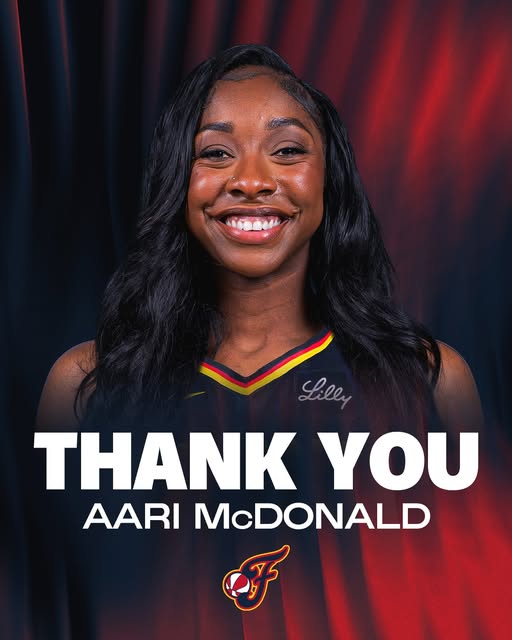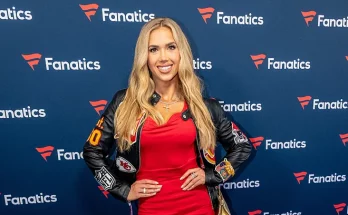It’s a decision that reverberated across the WNBA landscape the moment it was announced. Aari McDonald is not just another name on a roster—she’s a fiery competitor, a sparkplug who plays with unmatched energy and passion every time she steps on the court. But the business side of professional sports often demands difficult choices, and this one underscores just how brutal those choices can be.
McDonald’s release wasn’t about talent or effort. It wasn’t about chemistry or character. It was purely procedural, a technical necessity rooted in the league’s strict roster management guidelines. With teams required to maintain at least 10 active players and the emergency hardship exception only available under very specific conditions, the organization’s hands were tied. In order to stay compliant, someone had to be let go—and unfortunately for McDonald, that someone was her.
For fans, it’s a bitter pill to swallow. McDonald brought a jolt of electricity to every game. Whether she was diving for loose balls, chasing down fast breaks, or knocking down clutch shots in critical moments, she was all heart. Her energy was contagious, her leadership palpable. She played bigger than her size and tougher than her doubters ever expected. In many ways, she was the kind of player fans rally around, a symbol of grit and perseverance who never let up.
Letting her go, even temporarily, feels like losing a heartbeat of the team.
It’s important to remember where McDonald came from. A former top pick in the WNBA Draft, she built her name at Arizona, where she carried her team to the national spotlight and dazzled during March Madness. Her speed, defensive tenacity, and clutch scoring made her an instant favorite. That momentum carried her into the WNBA, where she continued to showcase why she belongs at the highest level.
Yet the WNBA, with its small roster sizes and limited salary cap room, forces franchises into cornered decisions time and again. This isn’t the NBA, with its 15-man rosters and G-League affiliates. In the WNBA, every spot matters. Every dollar counts. Injuries, illnesses, and scheduling conflicts can strain even the best-laid plans. And when hardship exceptions are used to fill short-term gaps, someone almost always pays the price.
Unfortunately, this time it was McDonald.
Her waiver is not a reflection of her abilities, nor is it a condemnation of her future. Quite the opposite—it’s an acknowledgment of her value that this decision caused such a reaction from fans and players alike. Other franchises across the league undoubtedly took notice, and it’s only a matter of time before another team sees her availability as a rare opportunity. Her story in the WNBA is far from over.
Behind the scenes, these decisions weigh heavily on coaches, front offices, and teammates. Aari McDonald isn’t just a name on a stat sheet—she’s a teammate, a friend, a competitor who brings intensity to practice and keeps morale high even on the toughest days. Losing a player like that can shake the locker room, disrupt rhythm, and challenge the very chemistry a team has worked so hard to build.
It also puts a spotlight on the broader issues facing the WNBA. As the league continues to grow, calls for expansion—both in terms of roster size and total franchises—are getting louder. Waiving talented players like McDonald due to arbitrary limits does the league no favors. It sends the wrong message. It says that even standout players can fall victim to rules that have not evolved alongside the game itself.
The WNBA is in a pivotal moment. With rising viewership, increased media attention, and more corporate partnerships pouring in, the league is better positioned than ever before to grow in substantial ways. But growth requires bold decisions. It demands investment in the players, the product, and the infrastructure. That means rethinking roster size. It means revisiting salary structures. And it absolutely means finding ways to prevent the loss of valuable players due to outdated regulations.
McDonald’s situation is more than a headline—it’s a case study. A reminder that progress is needed. A signal that talent and heart shouldn’t be expendable. And a call to action for those in leadership positions to ensure that the league’s rules evolve with the players who help define it.
There’s also an emotional side to all of this that fans can’t ignore. Aari McDonald isn’t just a basketball player. She’s a role model, particularly for young girls who see themselves in her fight, her flair, and her focus. Seeing her waived sends a ripple of confusion and frustration through those fanbases. Why does someone who gives everything still lose their place?
For now, McDonald will stay ready. That’s who she is. She’ll train, she’ll study, she’ll prepare. Because that’s what professionals do. And when her next opportunity comes—and it will—she’ll be ready to make an impact all over again. Whether that’s with the team that waived her or one lucky enough to add her in the coming weeks, her presence will be felt. Her story is far from finished.
Waiving Aari McDonald to meet a rulebook requirement is the kind of decision no franchise wants to make, but sometimes has to. That doesn’t make it right. It just makes it real. And for a league bursting with talent but confined by constraints, it’s a real problem that deserves urgent attention.
In the grand scheme of the season, this move may be a small footnote. But to those who watch the league closely, who understand the stakes, and who care deeply about the game’s growth, it’s a reminder of how much more work lies ahead. Because when the league starts prioritizing its players over its rules, there will be no more heartbreaking headlines like this one.
Aari McDonald is the kind of player every team should want. The kind of player who makes the game better. The kind of player who deserves more than to be sacrificed in the name of regulation. And as her journey continues, she’ll have an army of fans rooting for her every step of the way.
This was a difficult decision for the team. But the story doesn’t end here. For Aari McDonald, it’s just another chapter in a career defined by resilience, perseverance, and an unshakable love for the game.



